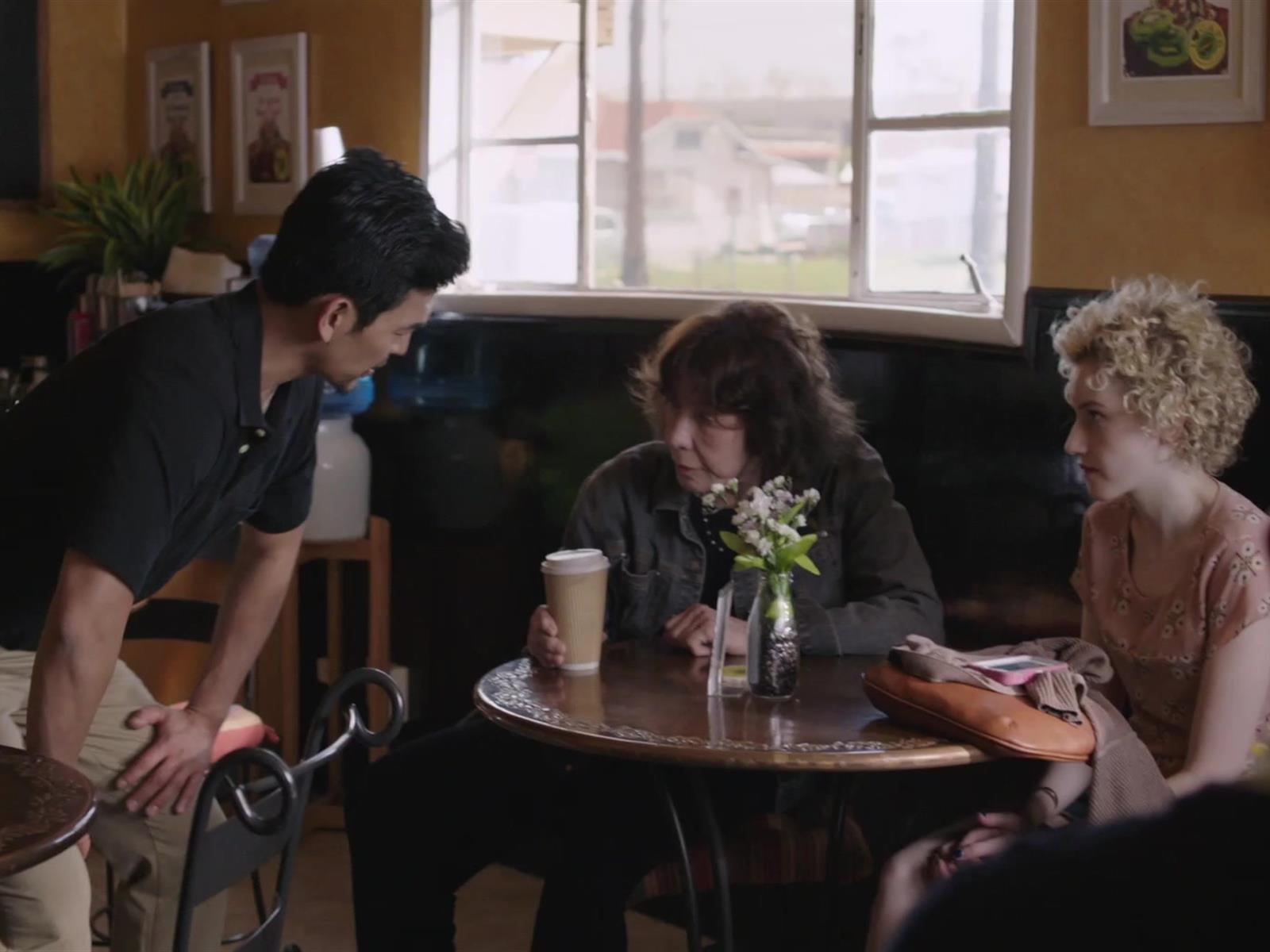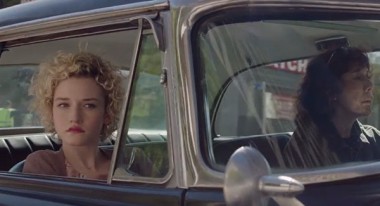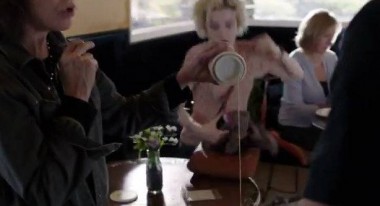 Back to selection
Back to selection
The Mommy Trek: Paul Weitz’s Grandma
 John Cho, Lily Tomlin and Julia Garner in Grandma
John Cho, Lily Tomlin and Julia Garner in Grandma “So I didn’t suffer for my art!” Feminist poet and lecturer Elle Reid (Lily Tomlin), an irreverent, confrontational carryover from the hippie era, yells defensively at Olivia (Judy Greer), a much younger former student of great promise as well as her girlfriend in a recent doomed relationship. The bitter ex has just aimed what in literary circles are insulting barbs at the seasoned author. “Writer-in-residence!” she screams outside the café where she is now waiting tables after abandoning her studies, much to Elle’s consternation. “Solipsist!” she adds to the sting.
I did suffer for my art. Sort of, and not for years, but certainly for one night last week. The lights were out in the Sony Screening Room when I arrived a few minutes late for a press showing of the film I am reviewing here. No one had bothered to change the burnt-out bulb inside the very first light cover that guides you down low steps from the top of the raked floor. After standing still for a couple of minutes to adjust my eyes to the darkness, I headed toward a nearby seat. Unfortunately, an invisible decline lay between me and the chair. I fell hard on both knees, and used my wrists in a pathetic attempt to break the tumble.
Several members of the audience watched — not that any of them offered a hand. Like Susan Hayward preserving her dignity after Patty Duke yanks off her wig and flushes it down the powder-room commode in Valley of the Dolls (“I’ll go out the way I came in”), I pulled myself up and stumbled over to my destination. Once in place, I felt the blood dripping down my right leg and took a mental measure of the pain coursing through my fragile torso. But I diligently remained through the final credits. Is that not sacrifice for the sake of Art?
Afterward, some very nice people on the late-evening staff cleaned the blood that had oozed out of the large cut on the right leg and offered to call the emergency medical crew or send me by ambulance to an ER for god knows what. No, I had to go home and write last week’s review. I’ve only had problems since, especially in my knees (MRI coming), shoulders, and wrists (fracture!) Worst of all is the irony of this exercise in klutzy acrobatics having taken place at a projection of a movie called…Grandma! This is the review written after the fall. What was that? FYI, you can be a grandparent even as young as 35.
Writer/director Paul Weitz divvies up this snappy, intimate film into six chapters with titles referencing Elle’s literary output (“The Ogre”) or the veteran activist’s “mode of production” (“Ink”). Two-thirds of the way through, we glimpse for the first time her complete opposite: tailored Judy (Marcia Gay Harden, on the mark as always), the materialistic, workaholic daughter she raised with late longtime companion Violet. A high-powered exec, pushy Judy acknowledges few boundaries both outside and inside the established system she thrives in.
Elle is entering Judy’s plush office in her trademark black sneakers and ‘60s jean jacket as faded as her looks and professional prominence. With her is her grandchild, Judy’s daughter by an anonymous donor, the beautiful, composed, and well-groomed Sage (Julia Garner), fresh out of high school and, at this stage of her life, an empty vessel concerning just about any subject, scholastic or worldly.

Not quite empty. Sage is pregnant, hence the surprise, financially motivated daytime visit. (Neither of the visitors has much to do with insensitive Judy. What Elle terms mistakes in her own life, Judgmental Judy less charitably labels choices.) Obsessively perusing business papers, Judy stands — not stiffly, in the Donald Rumsfeld manner — but is running in place. Multitasking beyond the word’s dictionary definition, she squeezes in her daily exercise. “This is my treadmill desk!” she boasts to her aghast kin. The scene is surreal and hilarious.
Otherwise, Harden plays the straight-arrow executive…straight. After all, the film is a vehicle for the 75-year-old Tomlin. She gets almost all the rest of the laughs in her first starring role since Big Business in 1988. A majority of her funny lines are deserved sarcastic put-downs, but from time to time so excessive that we sense a very unfunny motivation: the pain of losing Violet a year and a half before.
Elle also has serious scenes, mostly involving disagreements about politics, parent-child relationships, and of course abortion. Should Sage undergo one? Is it the optimal solution? How does the procedure differ from the illicit back-alley extraction Elle clandestinely underwent nearly five decades before?
Witness the reunion she has with Karl (Sam Elliott), her male lover during that long-ago time, whom she kept out of the loop (“I was a confused lesbian!”) A product of his gender and his generation, he flips in an otherwise moving, understated moment of reconciliation.
Let’s address for a moment a sign of the times. It is easier for commercial films to showcase openly gay characters who talk the talk than to articulate the A-word. We still hear euphemisms like getting rid of it or keeping it. Pro-life political parties, politicians, and pundits have remained so vehement that the entertainment industry is too nervous to be direct. The issue is not resolved. The Supreme Court’s ruling on gay marriage shut the door on overt discrimination against homosexuals, in life and in movies. What will it take to be free to use the word abortion, much less accept its utility?
The film business maintains a veneer of progressive social attitudes, but at the end of the day it is like a fiscal conservative: Will potential spectators be so turned-off about an issue that they might not put out for tickets? The fact that the inclusion of gay characters and subjects is hardly a factor in determining body count and box office receipts should be a lesson for those phobic about seeming too partial to a very real issue. Kudos to the people behind Grandma: Like Elle, no filters here.

Weitz, who shot the film in only 19 days, wrote it with Tomlin in mind. Known as a dependable director of big-budget Hollywood fare (About a Boy, Little Fockers, American Pie), he names in an LA Times interview some of the lower-budget films he draws from in his quest to go smaller and deeper, “to be completely pure.” These include two, also from 2012: Sean Baker’s Starlet and Norwegian filmmaker Joachim Trier’s Oslo, August 31st.
(He had mined his social conscience in the 2012 Being Flynn, another parent-sibling story based on Nick Flynn’s memoir, in which Robert De Niro’s ex-con writer on a downward spiral ends up in the same homeless shelter where his social worker turns out to be the son damaged by his absence and his late mother’s neglect.)
In Starlet, a lost, twentysomething woman who works on the fringes of the sex industry bonds and takes a trip with a reclusive octogenarian whose secret, once revealed, clarifies for us the course her life has taken. Oslo, August 31st’s suicidal, once-promising novelist who has lost much of his cognitive function to drugs attempts to rewire his mind by visiting sites and acquaintances from his foggy but more productive past. Grandma consolidates these basic plotlines and the events that drive them into a thorough, nearly seamless narrative tracking the transformation of three women from different eras. The credible, well timed unfolding of the changes is the film’s connective tissue.
Generically, this is a road movie in which Elle and Sage dust off Violet’s 1955 Dodge Royal Lancer (Tomlin’s own car) and drive — when the car hasn’t broken down — to places where people from her past might be amenable to loan the $600 cost of an abortion. Elle can’t provide it: She has finally paid off her debts and cut up her charge cards. (“Credit cards infantalize people,” she proclaims.) Sage may still be a blank sheet, but she does understand that caring for a child would put a damper on her plans for college. (Elle could be a spokesperson for higher education.)
She gets much more screen time than the others, and not just because she is played by Tomlin. She is the oldest of the three, and by far the one with the most unique and eccentric experiences. Her prior familiarity with the locations makes Grandma a biographical as well as a geographical road film. As amusing as they are, misanthropic Elle’s bitchy one-liners and uninhibited public behavior end up being less significant than her character development in the scheme of things. The witticisms are like little coupons pasted onto the film’s substantial core.
We relive her life with her, observing her history as literary figure, radical activist, café aficionado, doper, relationship junkie, tattoo recipient (from Laverne Cox’s goth Deathy) and, most of all, unfiltered loudmouth. She loudly calls vanilla patrons in a café “Ozzie and Harriet” and slowly pours coffee all over the floor when the angry manager insists that she leave. This is one woman who refuses to take shit from anyone.
Infuriation, over matters both insubstantial and important, is possibly Elle’s most apparent psychological feature. She forcibly strikes Cam (Nat Wolff), the irresponsible jerk who impregnated Sage, with his own hockey puck after he blames the girl and threatens to “fuck up” Elle herself. She is not just angry over the manner in which he treats them: She is burned up over the entire history of men and their attitudes toward females and what they do with their bodies.
Predictably, the fallout from the dissolved affair with Olivia has impact on her increasingly outlandish behavior. Elle goes from callously calling her a footnote to expressing loving selflessness. She can only calm down: There is no other way to move. In one scene, she lets slide her abandonment by a lying cab driver — and begins walking chirpily. For her, this is progress.
We know Judy is a tough piece of work more from observing her than from Elle’s vicious comments. We discover that Violet was the more maternal of the two mommies, and gave the young girl free rein. Bossy and demanding, she is a know-it-all who judges others based on surface criteria. As desperate as they are, neither Sage nor Elle wants to ask this hard, well-heeled woman for money for the abortion that would be merely pocket money.

Evidently the final straw in the enmity between Judy and Elle was their differing opinions on Violet’s care during her final illness. (Could this be the first film to dissect an oedipal problem with gay parents?) Their shared worry over the beloved Sage, however, does open up a space toward rapprochement. As difficult as it is for someone like her, Judy begins to own up to her shortcomings. Mother and daughter are able to speak about what has been festering inside them, and at least discuss what might hasten the healing.
And then there is Sage. In response to a remark about Elle’s nonconformity, Grandma hisses at the teen, “You’re not crazy enough!” Sage alters her stripes too. We know it from one sentence she spontaneously barks at her domineering mother: “Stop being an asshole!” Time stops: Elle is proud; Sage is relieved that she finally feels comfortable saying what she thinks; and Judy accepts that her submissive daughter has become mature enough to stand up for herself.
Sage and Elle have always connected in a more constructive way than either has with Judy. Could there be some truth in the clichés about the pluses of skipping a generation? Judy always rebelled against Elle and her values. Laid-back Sage grew up intimidated by control-freak Judy. Elle and Sage lack the proximity — physical and emotional — that mothers and daughters share. Discord interferes much less. Being blood relatives on top of that, they should indeed be close, empathetic friends.
The special bond allows for exceptional learning situations. Sage witnesses how Elle, for better or for worse, negotiates the world around her. And as much as Grandma trashes the younger generation, Sage’s ability to let things roll off her back rubs off on her, just as disengagement from Olivia had, in a different way.
Who’s to know what lies ahead? Perhaps Sage will become an even more stunning butterfly who, like Elle, embraces progressive causes and fights for justice, but rejects the side that demeans everyone and wreaks havoc all over LA. To paraphrase literature’s most overparaphrased phrase, every family is crazy in its own way.
